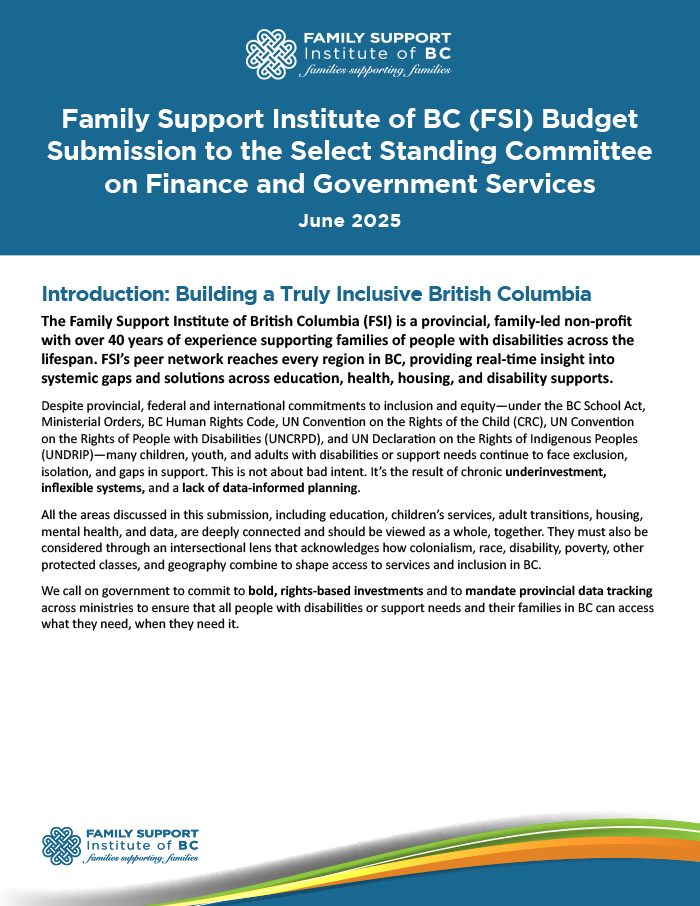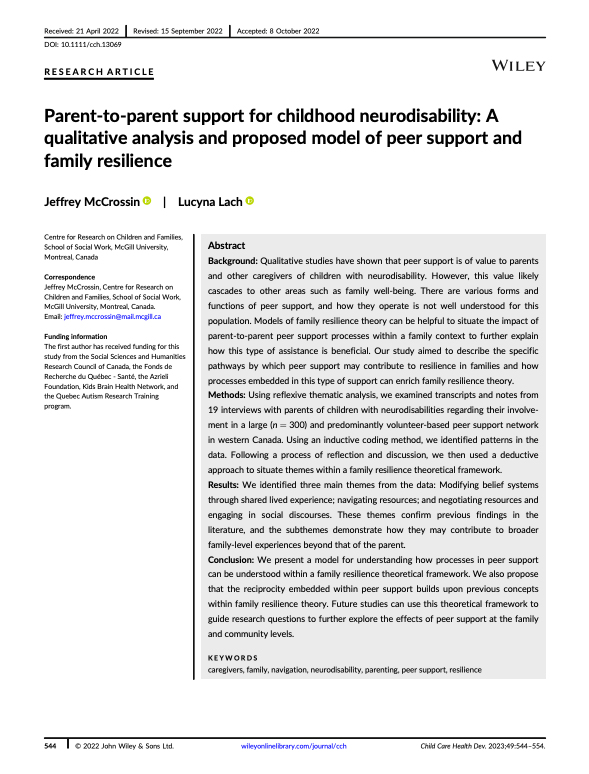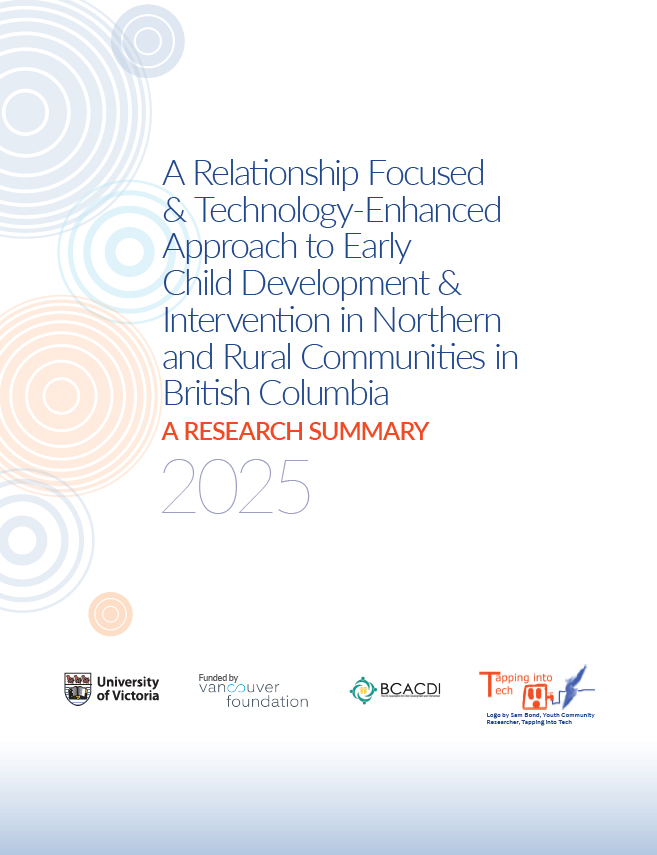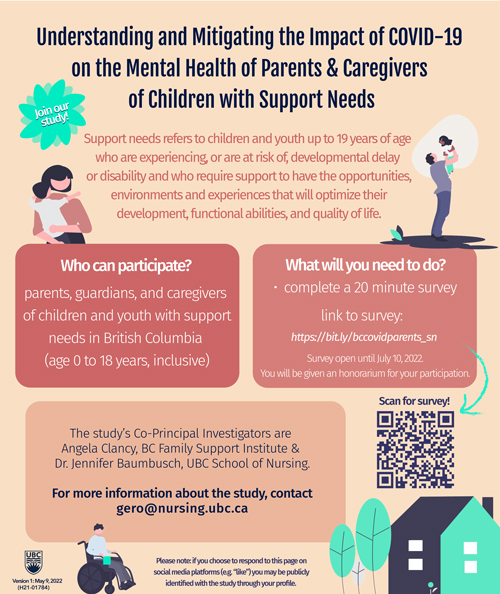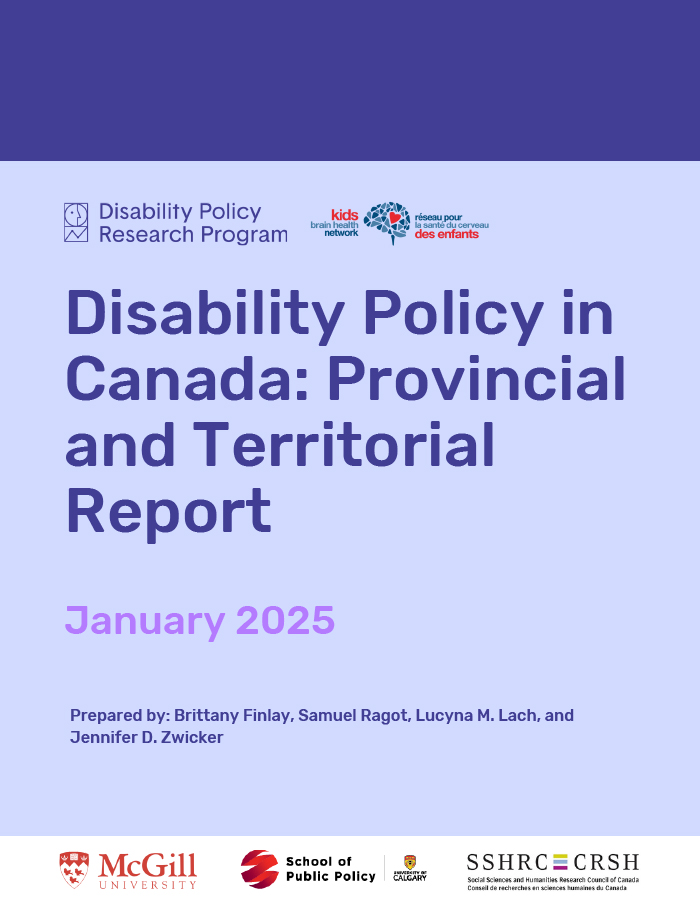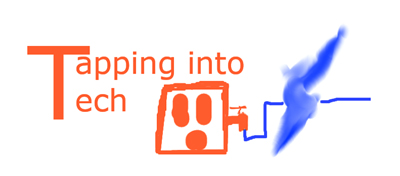Latest Research Projects
Here is an overview of recent research projects that the Family Support Institute is involved with, either as co-lead or community partner.
PROJECT OVERVIEWS
Family Support Institute of BC (FSI) Budget Submission to the Select Standing Committee on Finance and Government Services
June 2025
The Family Support Institute of British Columbia (FSI) is a family-led nonprofit with over 40 years of experience advocating for individuals with disabilities and their families. With a peer network spanning every region of BC, FSI identifies persistent systemic gaps in areas like education, health, housing, and disability services. Despite commitments under provincial and international frameworks—including the BC School Act, Human Rights Code, CRC, UNCRPD, and UNDRIP—many people with disabilities still face exclusion and under-support. These challenges stem not from a lack of intent but from chronic underfunding, rigid program designs, and an absence of coordinated, data-driven planning.
FSI’s submission to the Select Standing Committee on Finance and Government Services calls for integrated, rights-based budget investments and a province-wide mandate for data tracking across ministries.
Recognizing the interconnectedness of education, children’s services, adult transitions, housing, mental health, and data—and the compounded effects of colonialism, race, disability, poverty, and geography—FSI urges bold government action. Their aim is clear: ensure that all BC residents with disabilities and support needs, along with their families, can access essential services when and where they need them.
Children and Youth with Support Needs: The Family Voices Project
Project to inform CYSN services in British Columbia – until June 2025
The Family Voices Project is conducting meaningful engagement with the community to inform the work of the Ministry of Children and Family Development (MCFD). This project is part of a larger effort by the Province of British Columbia to redesign and improve services for children and youth with support needs (CYSN). For this project, FSI will engage with families of children and youth with support needs, focusing on four groups: families of complex kids, transitioning youth, families of kids with dual diagnosis, and self-advocates. FSI’s engagement process aims to be culturally appropriate and mindful of the access needs of diverse groups. This research project is conducted in collaboration with the UBC Canadian Institute for Inclusion and Citizenship (CIIC).
Parent-to-parent support for childhood neurodisability: A qualitative analysis and proposed model of peer support and family resilience
Centre for Research on Children and Families, School of Social Work, McGill University
The peer support and family resilience model in this article demonstrates how parent-toparent networks can modify family belief systems, help navigate complex networks of care, and support negotiation for access to meaningful resources.
Our study also identified how peer support can be understood in the context of family resilience theory and how reciprocity in peer support maintains processes of resilience. We believe this will be useful in building hypotheses around how interventions at the parentlevel can cascade to the level of the family and broader community. Future studies should explore caregiver perspectives on how peer support impacts their whole family unit.
Community Voices on Tapping into Tech
TWO-YEAR RESEARCH PROJECT 2021-2023
‘Community Voices on Tapping into Tech’ is a two-year (2021-2023), province-wide, community-driven research project aimed at improving rural and northern families’ equitable access to early child development (ECD) and health resources and services by using information and communication technologies as long-term, optional modes of service delivery in addition to in-person supports, programs and services.
With a newly formed, ‘Tapping into Tech Community Council’, this project is exploring how information and communication technologies (including apps, texting/messaging, Facebook, videoconferencing, etc.) can be used after the pandemic as long-term, alternative ways for urban and northern families to have easier and timely access to ECD and child health information and connect with services, in addition to in-person options. A priority for this project is to ensure that any related policy and practice changes are informed by and responsive to the priorities and preferences of Indigenous, non-Indigenous and newcomer families who for various reasons can find the ECD system in BC hard to reach.
This two-year, participatory action research project has the potential to make a large and lasting impact on the provincial early child development (ECD) system by mobilizing community knowledge(s) to tailor information and communication technologies in response to the lived realities, preferences and resources of northern and rural families and ECD agencies.
Case Study: Parent to Parent Support Among Families of Children Living with Disabilities
OCTOBER 2020
ABSTRACT:
Background: The term ‘navigation’ refers to a service that aims to facilitate interactions between service users, families, and/or service providers with the ultimate goal of improving access to care, and often includes some provision of emotional support. Peer support for parents as a form of navigation for families of children with neurodisabilities likely facilitates family resilience through their shared lived experience. However, there is little research available describing the experience of the key stakeholders engaged in this type of peer support.
Methods: Through thematic analysis of qualitative interviews, the present case study examined the experience of three mothers of children with neurodisabilities (a parent, a volunteer peer supporter, and a network coordinator) engaged in parent-to-parent peer navigation support.
Results: This case contributes to evidence that peer support serves a similar purpose to that of other forms of navigation support by increasing access to instrumental and emotional resources but differs in that it operates through shared lived experience. A unique finding was that the peer supporter used self-reflection and emotional expression in order to simultaneously provide empathy and bridge communication between the parent and service providers. Benefits and emotional challenges to providing peer support were reported. The network coordinator played a dual role, providing support to both the parent and peer supporter.
Understanding and Mitigating the Impact of COVID-19 on the Mental Health of Parents & Caregivers of Children with Support Needs
INVITATION TO PARTICIPATE – 20 MIN SURVEY AVAILABLE UNTIL JULY 1o, 2022
CREATE Caregiving Research Program is recruiting for research participants this summer to help:
- illuminate the contributions of caregivers at all points in the life-span
- examine the impact of caregiving on individuals’ mental and physical well-being
- inform policy and clinical practices to support caregivers.
Parents, guardians, and caregivers of children and youth with support needs in British Columbia (age 0 to 18 years, inclusive) are invited to participate with a 20 minute survey.
The study’s Co-Principal Investigators are Angela Clancy, BC Family Support Institute and Dr. Jennifer Baumbusch, UBC School of Nursing.
Self Injurious Behaviours (SIB) Workshop Series
SEPT 2021 – FEB 2022
Families and caregivers of children and youth impacted by Self Injurious Behaviours (SIB) is a 6-part educational workshop series combined with peer supports.
Workshop sessions will take place throughout 2021 and into 2022, and are part of a research project being conducted by the Principal Investigator (PI), Dr. Anamaria Richardson.
This project aims to promote education around severe SIB, create a supportive SIB community, as well as advocate for better health outcomes.
“What research means to us” — I am a community-based pediatrician, and I call myself an ‘accidental researcher.’ I never meant to enter this world, but listening to parent(s) and caregiver(s) stories daily in my clinic moved me to try and advocate for change. This is research. I need to convert ‘stories’ into ‘data’ that can then be presented, shared and disseminated in a language that is understood by policy makers, other researchers, communities, allies and foes. I hope that in my work I represent the needs of my patients properly and that together we can be loud enough to have others listen. Now I love research, as I see it as a means to advocate.
Impacts of Mental Health on Parents of Children with Disabilities and COVID-19
FINAL REPORT ANTICIPATED SEPT 2022
Family Support Institute is co-leading a research project with the University of British Columbia (Jennifer Baumbusch), Mental Health Research Canada, and the Michael Smith Foundation for Health Research (MSFHR), to better understand and mitigate the impact of COVID-19 on the mental health of parents and caregivers of children and youth with special needs in British Columbia.
Understanding the Disparities in Access to Essential Services for Youth with Disabilities and their Families
Fall 2019 & Spring 2020
Family Support Institute is co-leading a research project led by the University of Calgary, and supported by the Canadian institutes for Health Research (Dr. Jennifer Zwicker). This project is designed to understand the disparities in access to health, education, and social services for youth with disabilities and their families in Alberta and BC, across various stages of life.
One of the main objectives of this research project is to design policy recommendations and inclusive approaches to improve access to services. We have developed an Advisory Committee to help reach the objectives of the project and to help disseminate the work.
Outcomes from this project are directly aimed at influencing policy that will improve integration of services and supports for optimal brain development of children and youth with developmental disabilities, and working collaboratively with decision-makers.
Opinion: B.C. must put rights of kids at the centre of its disability policies (The Province; KidsBrainHealth Network)
Disability Policy in Canada: Provincial and Territorial Report, January 2025:
Cross-ministry data on service use and limitations faced by children in special education, Disability and Health Journal, October 2021:
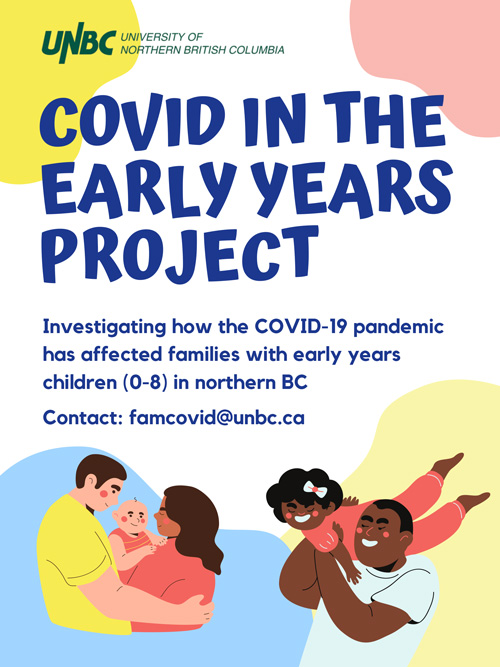
COVID in the Early Years Project
APRIL 2020-2021
Family Support Institute is involved in a research project with the University of Northern BC (UNBC), Northern Health (NH), and the Provincial Health Services Authority (PHSA). This community participation study is exploring the pandemic’s impact on the early years (ages 0-8 yrs) across Northern communities.
The team working on the COVID in the Early Years Project consists of people occupying a variety of roles — nurse, professor, service provider, researcher, student — to name a few. Participants come to the project with a different lens, and each of these viewpoints culminates into a common thread that gives purpose and meaning to this research.
“What research means to us” — At its base, this research means listening to families and getting to share in a little bit of their life. The goal is to gather what struggles and triumphs they find most important and impactful, and share these findings. From this, we can inform policy and service development to ensure that the services and supports they access best fit their needs. In this sense, research means amplifying the voices of those that may not regularly be heard, and allowing them to have an active role in determining what services they need and want.
Community Voices on Tapping into Tech
2 YEAR PROJECT — LAUNCH JULY 2021
Even before the pandemic, many families, living in rural and northern parts of BC, raising young children with extra support needs faced barriers to accessing a wide-range of supports and services for their children’s early health, development and wellbeing. COMMUNITY VOICES ON TAPPING INTO TECH is a province-wide, community-driven research project aimed at improving families’ access to early child development (ECD) and health resources and services in rural and northern BC.
TOGETHER, we will explore ways that information and communication technologies (including apps, texting/messaging, social media, videoconferencing, etc.) can be used after the pandemic, as additional, long-term ways for families to access information and connect with services in addition to in-person options.
OUR GOAL is to listen to and learn from Indigenous, non-Indigenous and newcomer families, children and service providers in rural and northern areas of BC about their experiences and ideas about using technologies for this purpose, especially families who experience social, economic and geographical barriers to in-person ECD information and services.
This project is funded by the Vancouver Foundation and is co-led by Dr. Alison Gerlach from the University of Victoria, Jason Gordon from the BC Association of Child Development and Intervention and a ‘Tapping into Tech Community Council’ made up of grassroots child disability advocacy groups, rural and northern parent, young people with lived experience of disability, and ECD frontline providers as community researchers, and university researchers. The Council guides and supports the project, ensuring the voices of the community inform the research design and mobilization of the findings. Family Support Institute is funding a Parent Reference Group that will help to bring diverse parent voices to the research process.
This two-year participatory action research project has the potential to make a large and lasting impact on the provincial ECD early childhood system in BC by mobilizing community knowledge(s) to tailor information and communication technologies in response to the lived realities, preferences and resources of northern, rural and Indigenous families, children and ECD providers.
If you are interested in learning more or getting involved – please contact Project Manager, Theresa Hunter:


